The movie industry has grown a lot over the years and continues to expand at an incredible speed. The industry as a whole shows healthy growth projections for the coming years.
There is no shortage of movies for you to review, and with more and more people turning to the internet for entertainment and news, now is a great time to start a movie blog.
A movie blog will provide you with a platform to reach massive audiences online. It’s a great way to show others your point of view and share your thoughts on movies you care about.
You will be able to create a community of friends and movie lovers who will flock to your blog for the latest industry news, movie review information, and more.
This guide on how to start a movie blog will provide you with everything you need to start making money doing something you enjoy.
Editors Note
This guide is extremely DETAILED and explains everything you need to start a Movie blog. I’ve been at this blogging stuff for over 8 years and have built a business making $20,000 per month, so I have a lot of helpful advice for you newbies out there.
If you get stuck or need advice, I HIGHLY recommend that you get my 100% FREE blogging course by clicking here. If that doesn’t help please contact me directly and I’ll help you out for free.
How to Start a Movie Blog in 10 Steps:
Starting a movie blog is a lot easier than you might imagine. Even if you have zero experience building websites, this guide will take you through the step-by-step process so you can build, grow, and monetize your film blog.
But first, let’s take a look at some of the reasons why it’s a great idea to start a movie blog:
Review Movies: Getting to review movies is something that many movie lovers would do even if they weren’t being paid for it. With your own blog, you get to review all the movies you love (and hate) and make a decent income doing it.
Let Your Voice Be Heard: One of the most common reasons people want to start a movie blog is for the love of movies. Your movie blog will give you a platform where you can talk about various things that interest you in the world of cinema.
Improve Your Writing Skills: As one blogger once said, good blogging comes from passion. If you’re passionate about writing about movies, it will help you improve your writing skills significantly.
Make Money: Although there are many reasons why you might want to start a movie review blog, one of the main reasons is that you can make money doing what you love – and you get to work on your own schedule.
Get Early Screenings to Movies: As you begin to establish authority in your niche, you will start to get early screenings to movies. The more popular your blog becomes, the more opportunities will open up to you.
Meet Actors and Directors: When you start a movie blog, there will be tons of opportunities that present themselves to you if you remain persistent. For instance, you may get on the studio press invitation list and get to meet actors and directors that you admire.
Get Film Memorabilia: Yet another benefit that comes with starting a movie blog is that you get access to film memorabilia.
These are just a few of the many reasons why starting a movie blog is such a great idea. And now, on to the fun part where you can get started creating your blog.
1. Decide the Focus of Your Movie Blog
In order to ensure your success, you need to start your movie blog with a purpose. And so, your first step is to decide the focus or direction of your new blog.
This is something that is overlooked by a lot of bloggers, and it’s one of the main reasons why so many of them ultimately fail.
Below are some ideas that are possible ways to position your blog so you can have the best chance of success. Take the time to go through each so you can get some ideas as to the direction of focus for your new blog.
- Movie Reviews: Your blog can be focused on current movie reviews.
- Movie Recommendations and Criticisms: Movie critic blogs like Roger Ebert are also a popular option.
- Directors or Actors’ Careers: Your blog can also be about criticizing or talking positively about directors/actors and their careers.
News About Movies: Alternatively, you can make your blog about news and movies that are coming out and how released movies are performing
2. Choose Your Movie Niche
Your next step is to choose your movie niche. Your niche is simply a corner of the market that you’re most knowledgeable about. It’s the place where you can establish yourself as an authority or expert on the topic.
Don’t create a generic blog that focuses on a niche like “movies”, which is too broad, or “movies in 1975” which would be too narrow
Instead, you want to find the sweet spot for your film blog niche, where it’s not so broad that it’s impossible for you to get noticed, or so narrow that you’re left with very little room for growth.
You must choose a niche for your blog that will allow you to attract an audience while giving you room to expand your blog in the future.
Why it’s Important to Choose a Niche
By choosing just one narrow niche, you make it more likely that you will be able to amass an audience of engaged followers. If you blog about all things that are movie-related, it will make it hard for you to build an audience for your new blog.
Also, choosing a niche helps to make it more likely that you will be viewed as an expert or an authority in that niche.
There are many different types of niches you can focus on with your blog. I’ve listed some of them below to give you inspiration and help you brainstorm additional ideas.
- Choose a Movie Genre: Your blog can focus on any of the different movie genres, including horror, country, comedies, drama, thrillers, action, and so on.
- Generalized Movie Blog: You can blog about movies in general, although I wouldn’t recommend this course of action as you will be taking on established blogs like ScreenRant right from the beginning.
- Movie Blog Focused on Directors: An example of such a blog is Strictly Film School, which arguably embodies cinephilia in the internet age better than any other blog.
- Asian or Foreign Films: Your niche can be focused on Asian movies, like the Asian movie blog MissMalini.
- Indie Films: This is yet another niche that is extremely popular among movie bloggers. A great example of this type of blog is No Film School Blog.
- Hollywood Blockbusters: If you choose this niche, your blog will focus on providing a thoughtful and analytical approach to the output from Hollywood.
- Classic Hollywood Movie Blog: A classic movie blog will allow you to share news and information about classic movies, like the blog Out of the Past
- Retro Films: If you love retro films, you can dedicate your blog to the celebration of cinema retro.
- Netflix Movie Review Blog: Your blog can be focused on reviewing Netflix movies specifically.
By now, I’m sure you’re getting the picture. The list of possible niches is virtually endless. You can also choose Experimental movies, Broadway, RomComs, Documentaries, etc. as your niche, or even combine different niches to come up with something unique.
Just remember, the movie industry is extensive, so don’t try to be all things to all people with your new blog. Pick a niche that interests you and move on to the next step. You can always expand on it later.
The niche you choose will guide your content strategy.
However, keep in mind that you can still write about different topics on your blog. For instance, The Movie Blog is clearly focused on writing about Hollywood films, but they still occasionally publish about Asian films, Indie films, and documentaries.
The main focus of the film blog Screen Anarchy is Asian and Foreign films, but they also comment on bigger Hollywood films once in a while.
Once you know your focus, you will be able to keep your direction clear. But, every now and then, you can allow yourself to talk about other things that interest you.
3. Choose Your Blogging Platform
Before you can start blogging, you need to have a blogging platform. This is the software that will allow your blog to be available online.
There are many platforms to choose from, both free and paid, but I recommend that you steer clear of free blogging platforms like Blogger, Wix, and Squarespace.
Although it may be tempting to start your new movie blog with no investment of money, below are some reasons why you should avoid this course of action.
Reasons to Avoid Free Blogging Platforms
- The features are quite limited and will limit your ability to grow and monetize your blog in the future.
- You don’t have full control over your site, and any SEO work that you do will benefit the free blogging platform and not your own website.
- Also, your site can be shut down with no prior notice if you violate their terms of use in any way.
- Free blogging platforms look unprofessional. Instead of having a name like “MyMovieBlog (dot) com”, you’ll have to use something like “MyMovieBlog.SquareSpace (dot) com”
- The host may show ads everywhere on your website – some of which may not even be related to the type of content you produce, which means you risk alienating your visitors.
Free blogging platforms do nothing to help you build trust in your relationships with your readers. After all, who would take your movie blog seriously if you can’t even be bothered to get your own hosting and domain?
That’s why I recommend that you choose self-hosted WordPress as your blogging platform. (Keep in mind that this is different from the free WordPress (dot) com blogging platform).
Why Choose Self-Hosted WordPress over Free Blogging Platforms
- WordPress is free to use. It’s also very easy to download and install
- The software is user-friendly and great for beginners without any coding experience
- WordPress comes with tons of free and paid plugins for extending site functionality
- The platform offers affordable themes for easy website customization
- WordPress also integrates with many other services and apps
- The software offers a lot of flexibility in monetizing your movie blog
- You also get support from a huge community of users and developers
Take a look at these recent WordPress statistics to get an idea of just how popular the WordPress blogging platform is:
- WordPress powers 60% of all websites that are built on CMS
- The number of WordPress sites online grows by about 4% each year
- WordPress websites get over 400 million visits every month
- More than 660 WordPress blogs are built every single day
- WordPress has over 50,000 free and paid plugins to choose from
4. Decide Your Domain Name
Your domain name is what you’re going to call your new movie blog. For instance, if you name your blog Weird Horror Movies, then your domain name will be WeirdHorrorMovies (dot) com, or WeirdHorrorMovies (dot) net, etc. In short, the domain name will serve as your blog’s address online.
You need to choose a name that is short, unique, catchy, and memorable. This way, you make it easy and convenient for your blog followers to type the name in their browsers when they want to return to your blog.
Listed below are 10 steps to help you choose a memorable name that is also brandable and aligned with your style.
1. Go with “.com”: Although there are tons of other movie-related domain extensions, such as .movie, .film, etc., I recommend that you choose a domain name with a .com extension as this will help to build trust with your readers.
2. Choose a Broad Name: Try to avoid choosing a name that is too narrow. For instance, if you choose a name like “Fun Wedding Movies”, it limits the type of content you can create and makes it hard to grow and expand your blog over time.
3. Keep It Short: Your name should be short and easy to type into the browser. So, avoid long or complex words and keep your movie blog name to just two or three words, if you can. If necessary, you can use up to four words, but try not to exceed that number.
4. Make Use of Alliteration: Alliteration is the use of two or more words that begin with the same sound or letter. Using this tactic helps to make your blog name more memorable, like Film Fans, Trailer Tyrant, or Movie Mania.
5. Get Creative: If the name you want for your new movie blog is already taken, you can use synonyms or other similar words to find a name you might be happy with. For instance, if you wanted the name “Awesome Action Movies”, you might consider using something like “Epic Action Movies” instead.
6. Add Extra Words: If you’ve tried everything else and you still can’t get the name you want, try adding extra words like “the”, “blog”, “hub”, etc. You may also consider using keywords in your title. For instance, if your blog is focused on classic movies, you might choose a name like “Classic Cinema Mania”.
7. Think of a Concept: Imagine how your movie blog could be branded, or how you might expand the blog in the future. This will help you come up with ideas for unique names for your blog.
8. Use Name Generating Tools: If all else fails and you find that you are still stuck for a name, use domain name generators like Lean Domain Search and Instant Domain Search. Simply enter some keywords, and the tool will present you with a list of possible domain names for your new movie blog.
9. Don’t Purchase a Domain Name: You may find that the name you want is already taken and being offered for sale for hundreds, or maybe even thousands of dollars. Don’t be tempted to buy it.
Instead, go with a standard domain name and use that money to help you create valuable content to grow your site. Later on, when you’re blog is profitable, you can then purchase any domain name you want.
10. Don’t Get Stuck at This Stage: A lot of people who set out to start a new movie blog never make it past the stage. Picking a name is an important part of the process, but it shouldn’t take you longer than a couple of hours to get through the steps outlined above. Choose a name that you’re happy with, and move on to the next step.
Examples of Popular Movie Blogs (and why their names make sense)
- Movie Marathon: This movie blog makes use of alliteration to create a name that is easy to remember.
- Filmy Site: This name is short and sweet. It’s easy for blog visitors to type into their browsers.
- Filmoholics: This blog name is short and unique. It makes it clear that the blog is focused on avid movie lovers.
- Movie Marker: As with the example above, this blog also uses alliteration to create a name that is easy to recall.
- Back to the Movies: This is a memorable name for a blog about classic movies. It’s a play on the title of the popular sci-fi adventure film, Back to the Future.
Here are 10 ideas for movie blog names to get your creative juices flowing:
- Heroes of Cinema
- Wedding Movie Reviews
- Savvy Movie Watchers
- Horror Movie Hub
- Crazy Classics
- Fun Film Fans
- Fetch the Popcorn
- Dread Central
- Flick Chart
- Trailer Tyrant
5. Buy Your Domain Name and Hosting
Your next step is to actually buy the domain and hosting for your website. If your domain name is your blog’s address, and your website is your movie blog’s actual home on the internet, then the hosting is the real estate on which the house will be built.
You rent this real estate from web hosting providers. In return, they host your website on their servers and ensure that it’s always visible online for your audience to find.
There are many web host providers that you can choose from. I recommend you use Bluehost, a reliable web host that has been around for a very long time that’s also recommended by WordPress. They offer affordable services for new bloggers.
So, when someone types in your website URL, then Bluehost will show your blog to the individual who searched for it.
I’ve created a step-by-step tutorial to walk you through the entire process of buying your domain name and hosting. The first thing you need to do is click on this link to visit Bluehost and follow along with the tutorials below.
Below is a YouTube video and screenshots showing you the exact step-by-step process, choose whatever tutorial that works best for you.
Step 1: If you haven’t yet, click on this link and you’ll be brought to the WordPress Hosting page that you see below.

Step 2: Next, you’ll be brought to the hosting plan page. You could choose to get a “Plus” or “Choice Plus” plan, but honestly, that’s not a requirement.
The Startup plan is the cheapest at $2.95/month through my link vs. the normal $8.99/month.
This plan has everything you need including 50GB of webspace (plenty of room for your files), a free domain for a year, plus other standard features like a free SSL and a secure WordPress install. Feel free to browse a bit to decide the right plan for you, but rest assured that Basic will work just fine if you want to minimize your investment.
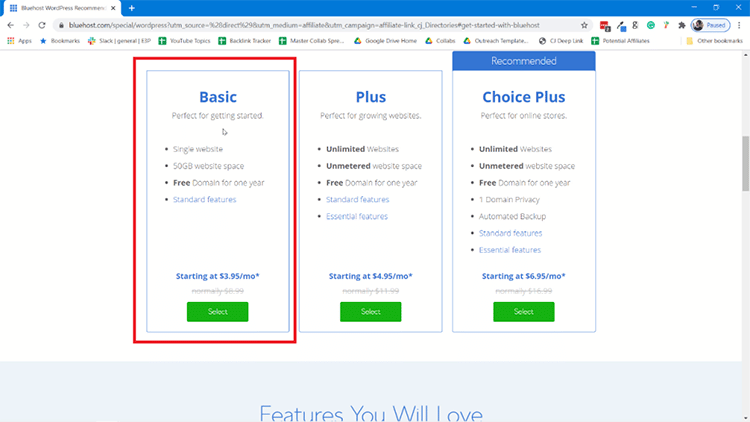
Step 3: After clicking into the plan, you’ll be brought to the next page where you will type-in your new domain, or you can just choose “I’ll create my domain later” if you haven’t decided on one yet. The domain is the URL people will type into a browser to view your website in the future.
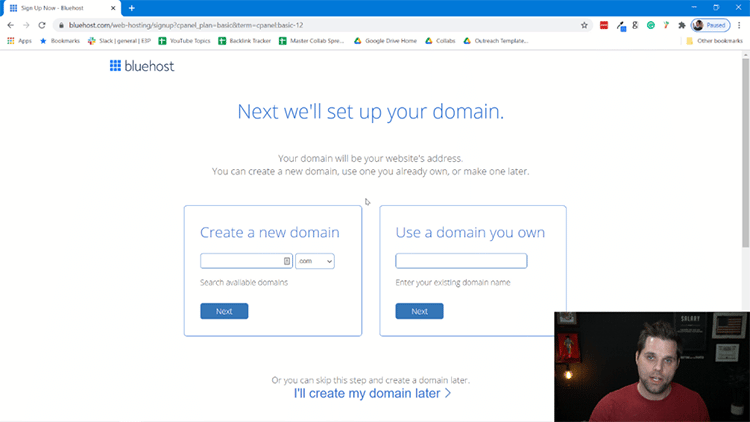
Step 4: Once you submit, the next page will ask for all of your information. That will start with your account information, which is self-explanatory.
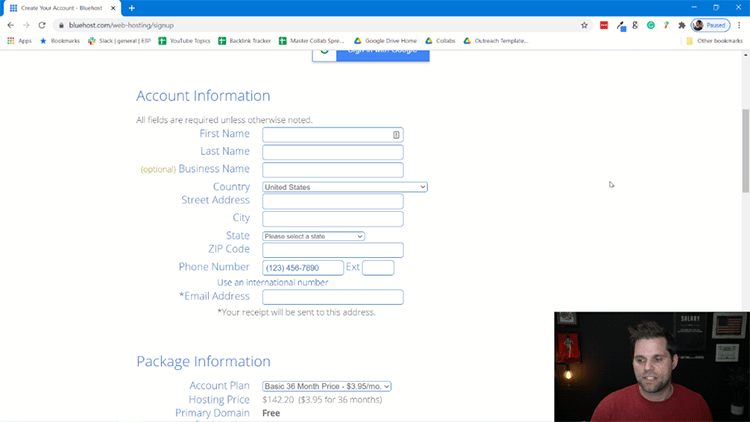
Step 5: Next, you’ll have to input your Package Information. This is to choose how long you want the plan to go for. My advice is that you choose 24 months to get the discount and save some money, but you can go as low 12 months if you want.
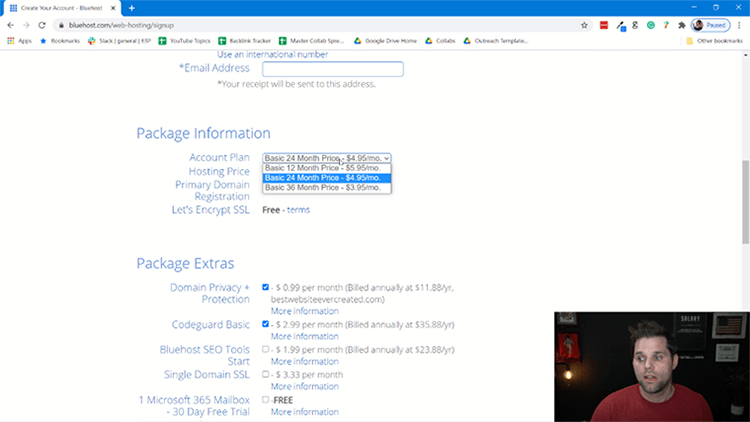
Step 6: Next you’ll have to choose what “Package Extras” you want. You can scroll over “More Information” to understand what each of these items are, but here is my own advice.
I would get the “Domain Privacy + Protection”, this makes it so that no one can tie your name to the domain name you create. To me, the only other one worth considering is “Codeguard Basic”. The other two I wouldn’t personally get. But choose what is best for you.
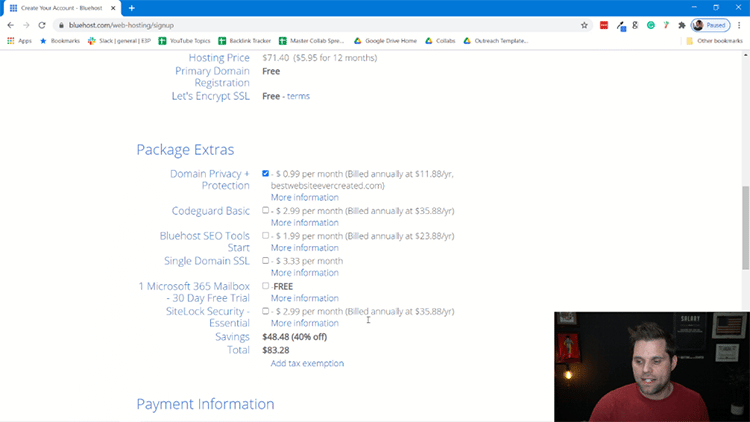
Step 7: The next step is Payment Information, which is self-explanatory.
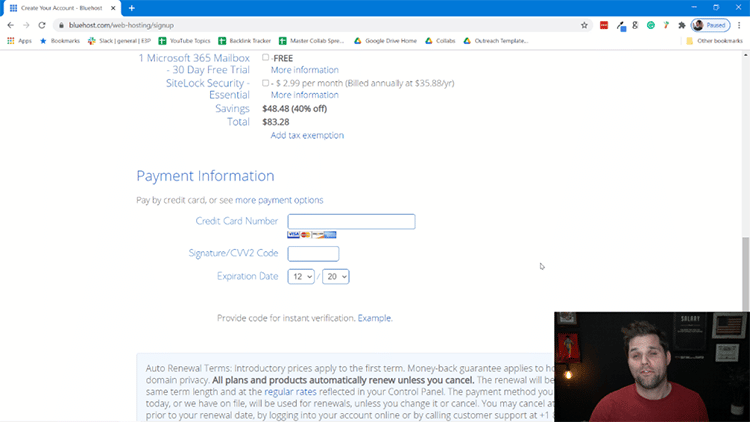
Step 8: And the last step of signup is to confirm that you read and understand the Bluehost Terms of Service, Cancellation Policy, and Privacy Notice. Click the check button and then click “Submit”.
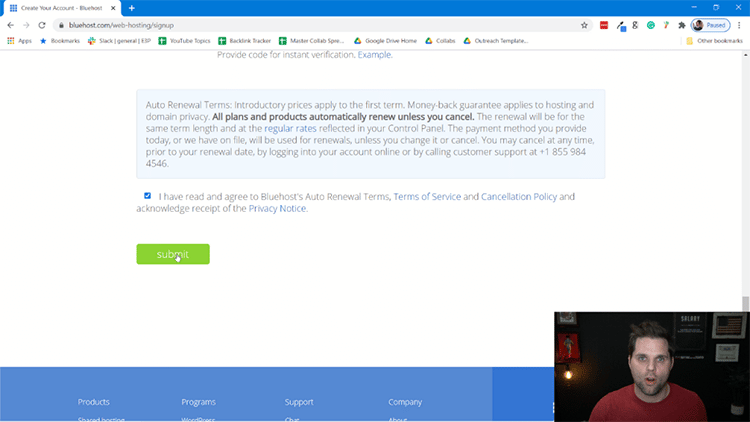
Step 9: Next you’ll be prompted to create an account and password. This is the information that you’ll use to login to the Bluehost platform to manage your site and account info.
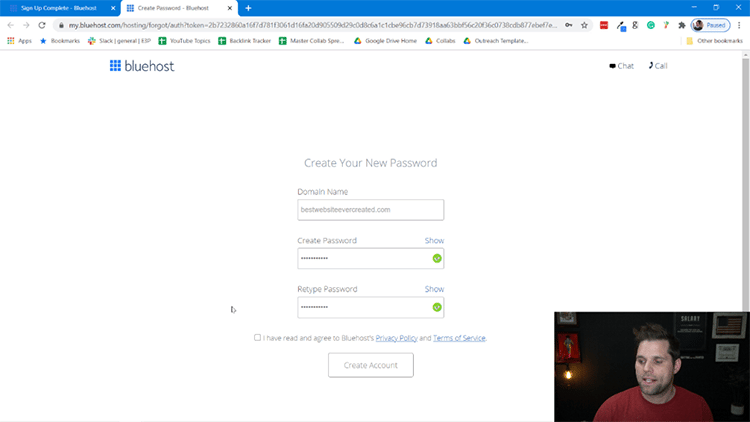
Step 10: At this point Bluehost puts you through a short questionnaire to better understand your scenario. You can answer all of these questions, or click “Skip this Step” on the bottom. If you’re a newbie, I advise you to answer the questions as it’ll help your onboarding experience.
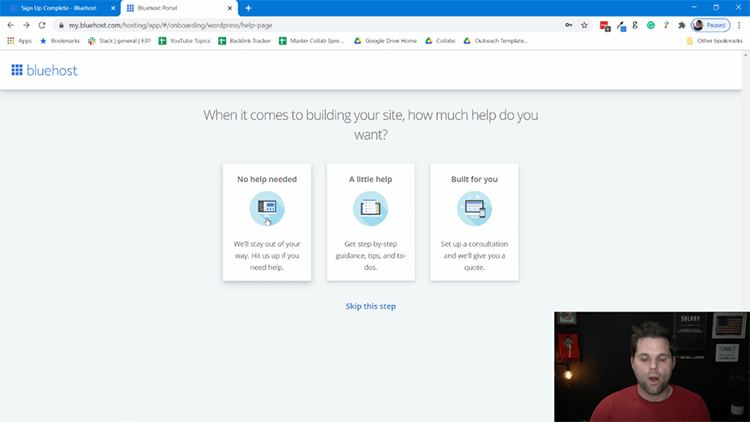
Step 11: After you’re done with that you’ll be advised to choose a theme. For now, you can just choose to use a free theme. You can always replace the theme later if you’d like.
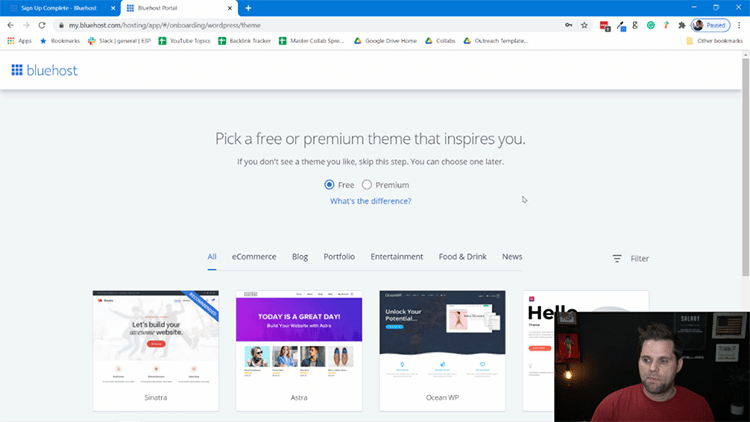
Step 12: From there, you’ll be brought into the backend of WordPress in the admin panel. This is where you’ll manage your site from. You can add posts/pages as you see fit, but when you’re ready click on the blue button that says “Launch Your Site”.
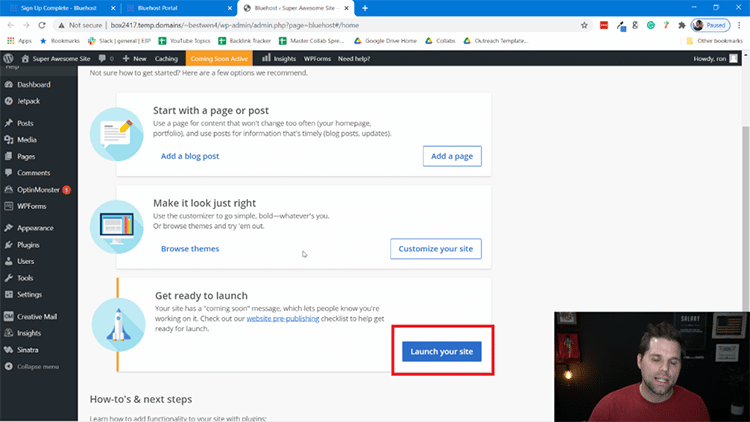
Step 13 (Final): Your blog is LIVE. Just go to a browser and type in your domain name. Once you do this, you’ll be able to access your website!
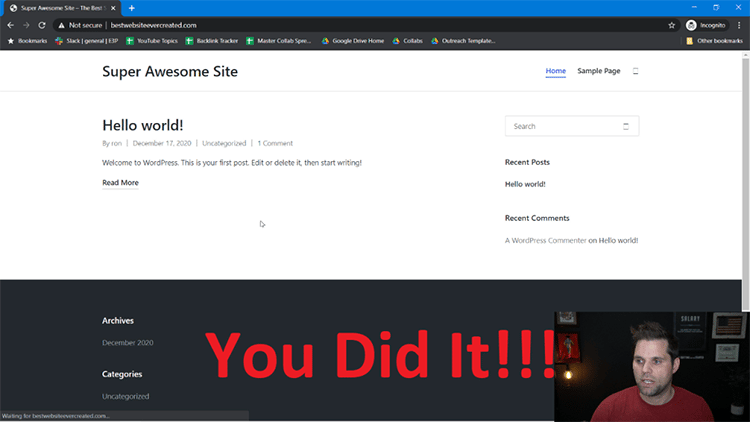
Congrats! You officially have a website.
If you’re wondering how to edit things on the website, all you have to do from here is go to your website URL with /wp-admin at the end in a browser and login.
Example: http://mostawesomewebsiteever (dot) com/wp-admin
And don’t worry, we cover how to edit things more in the rest of this guide as well. So please continue reading.
6. Choose and Install a Theme For Your Movie Blog
A theme is a piece of software that determines how your blog looks. I don’t have to tell you how important aesthetics are for a movie blog.
That’s why you need to choose a good-looking theme that will attract visitors to your blog and help you maintain audience engagement for as long as possible.
There are tons of WordPress themes to choose from, including free themes and premium themes. I would advise against using a free theme because they are hard to customize and your new blog will end up looking like thousands of other movie blogs online.
If you want a blog that stands out, you’re better off choosing one of the many premium WordPress movie themes available.
Advantages of Choosing a Premium Theme
- Constantly Updated: Premium WordPress themes are always updated by their developers. This is not the case with free themes.
- Full Features: When you purchase a premium theme, you get access to all the theme’s features, as opposed to using a free theme where most of the features are locked, thereby limiting your ability to customize the theme.
- Well Optimized: Premium themes come mobile and SEO-optimized. All you need to do after purchasing the theme is to upload and activate it on your blog.
- Customer Support: With premium themes, you also get reliable tech support, which makes them ideal for new bloggers.
- Enhanced Security: Premium WordPress themes come with inbuilt security that helps to fight off malicious code and keep your site secure.
Now that you understand the importance of choosing a premium WordPress theme for your new film blog, let’s take a look at some examples of themes that are great for movie blogs.
Here are a few examples of themes that are great for a movie blog:
- Divi: If you’re looking to design a stunning website with ease, Divi from Elegant Themes stands out as arguably the best WordPress builder available today. Its intuitive visual drag-and-drop interface empowers users to craft amazing sites quickly. What sets Divi apart is its vast array of customizable modules, real-time design feedback, and a responsive editing feature that ensures your website looks impeccable on any device.
- Astra: While Divi is renowned for its versatile design capabilities, the Astra theme offers a distinct set of advantages for those prioritizing speed, performance, and seamless integration. Astra stands out for its feather-light weight, ensuring that websites load at lightning-fast speeds—a critical factor for SEO and user experience. Moreover, Astra’s deep compatibility with major page builders, including Elementor and Beaver Builder, means that users aren’t restricted to a single design environment. The theme is also built with a focus on customization as well. You can read my Astra Theme Review is you want to learn more.
- Themeforest.net: Themeforest has a significant amount of themes far beyond other platforms out there. There are over 48,000 total themes available on this platform, so you can find whatever you need.
And here are some other examples to consider, but the above options are my preferred ones for sure.
1. Vodi – Video WordPress Theme for Movies & TV Shows
This theme is ideal for Netflix, YouTube, and IMDB-like sites. It comes with 6 demos, 47 Gutenberg blocks, and various other features that will allow you to fully customize your movie blog to make it unique and attractive.

2. Filmax – Cinema & Movie News Magazine WordPress Theme
This theme has a powerful framework and three layouts that offer you spectacular options for your movie blog. The theme is retina-ready and you can easily publish your movie and film reviews, trailers, and much more.

3. THE PASSION – Multipurpose Movie Video & Music WP Theme
The passion is an epic responsive, multipurpose theme that is ideal for movie blogs. It comes with a video magazine with a fronted upload option, and it also has WooCommerce, as well as a visual composer.

4. Vlog – Video Blog & Podcast WordPress Theme
This theme is perfect for video blogs and podcast websites. It has a ton of great features and allows you to easily create your own YouTube channel site, which makes it great for a movie blog that publishes lots of video content.

5. Blockter – Movie and TV Show Database Website WordPress Theme
This WordPress theme is fully responsive and perfect for movie databases and TV show sites. It has clean code and a professional interface that is dark, modern, and attractive. It also has a powerful built-in movie library plugin that allows you to easily import movie data from TMDB with just one click.
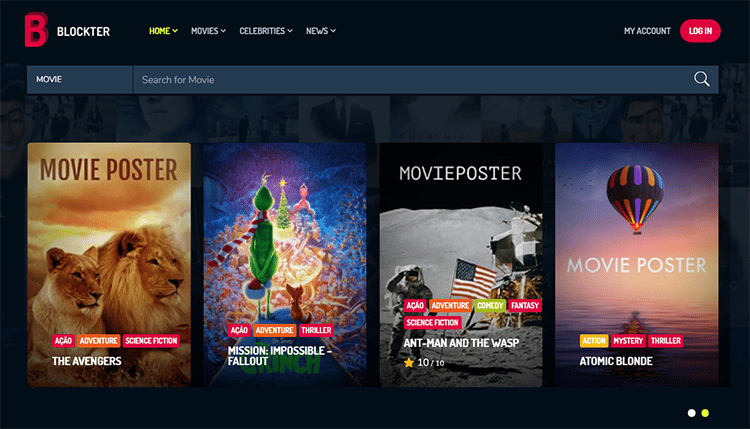
These are just a few themes that you can choose from. If none of them appeal to you, you can search through theme marketplaces like Theme Forest, Studio Press, and Envato to find the perfect WordPress movie theme.
Listed below are the most important factors to consider when choosing the best theme for your movie blog.
What to Look for in a Great Theme:
- Mobile Responsive and Fast
- Beautifully Designed and Professional-Looking
- Templates to Match Your Style
- Responsive Technical Support
- Created by a Well-Established Brand
- Good Ratings From Users
Once you’ve found a theme that you’re happy with, and have it installed on your blog, it’s time to start creating pages for your blog.
It should be noted that there are also website builders for filmmakers out there, but if you’re looking simply to discuss films and have a blog focused on movies, this probably isn’t for you.
7. Create Essential Pages & Logo
This step involves creating your blog’s essential pages. These are the main pages that will help you build trust with your audience, and so it’s important to take the time to ensure that you craft the content well.
These pages include the About page, Contact page, and Privacy Policy page. Let’s take a look at each of them in a bit more detail:
About Page: On some movie blogs, you may see this page titled “My Story”. This page is where you share information about yourself, why you started a movie blog, and so on.
The people that follow your blog want to get to know you, and people love good stories, so use this page as a means to connect with your new audience and give them an idea of the type of value they can expect from your blog. You can also include an image of yourself on this page.
Contact Page: If any of your readers need help or want to collaborate with you, they should have an easy way to reach you. You can use the Contact Form 7 plugin on your WordPress blog to create a professional-looking contact form for this page.
You can also include other information, such as your email address, phone number, Skype, address, etc. to give your readers different options and make it more convenient for them to get in touch with you.
Privacy Policy Page: If you collect any personal information (e.g. names, emails, etc.) from your blog visitors, then you are required by law to have a privacy policy agreement. The purpose of a privacy policy is to inform your blog visitors about your process for the collection and use of their personal data. Check out my list of the best privacy policy generators for free and paid options to help.
In addition to the Privacy Policy page, you may also include other legal pages, such as a Copyright page where you can explain that the content on your movie blog is fully yours and that you don’t want any of your content to be used without your consent.
Create a Logo: It’s also a good time to focus on creating a logo for your movie blog. There are a LOT of different ways to do this, but I’m a big fan of using using a logo maker.
To get started, you should view this list of the most reputable logo-maker platforms. I think it’s a good idea to create a logo at this point now that your blog is all setup.
8. Begin Blogging
You have to regularly publish new content in order to build a targeted audience for your movie blog. Without an audience, you will not be able to make your blog a success, let alone monetize it. Content will also play a huge role in helping you become a “pro” in the movie review industry.
The type of content you create can include:
- Evergreen Articles: These have a long shelf life. They will continue to draw readers to your movie blog for a long time.
- Videos: The explosive growth of video-sharing sites like YouTube and video-based tech like TikTok offers a ton of opportunities for video content creators to connect with a global audience.
- News-Type Articles: We’ve established that as a movie blogger, you are not a news journalist. However, you can publish news-type articles or any other announcement-type content on your blog.
- Image Heavy Content: More and more people are choosing videos and image-based content over written text on blogs. You can make your blog more appealing to different segments of your audience by including lots of eye-catching imagery in your posts.
- Mix-And-Match: If you want your blog to stay fresh, you need to publish a variety of content. You will obviously have your popular posts that resonate the most with your audience, but it’s also important to provide a variety of content so you can cater to a wider audience.
Just keep in mind that just because you have to publish regularly doesn’t mean that you should regularly publish low-quality content.
You must choose a blog posting frequency that allows you to consistently create high-quality content that resonates with your target audience.
But what exactly should you write about?
Here are a few ideas and writing categories to give you inspiration for creating content for your blog.
- Film reviews
- Film hauls
- Your favorite (or least favorite) genres
- X thoughts while watching __
- Review film streaming services
- Your favorite actors or actresses
- Top 10 film flops of the year/century
- Your favorite (or least favorite) directors
- Book vs. film
- Awesome film-related gifts
- Share unpopular or controversial opinions
- Badly-written film plots
- Everything wrong with __ (movie)
As a movie blogger, you will never run out of things to write about! There are tons of new movies coming out, which means you can make reviews daily if you want to.
Just keep in mind the following important things:
Do keyword research: You need to understand keyword research so you can rank your posts for low competition keywords. You also need to implement on-page SEO best practices. You can use a plugin like Yoast SEO which will provide you with all the data you need to optimize your website for search.
Consistency Is Key: Becoming a movie blogger is not the route to quick riches. Some people think that by publishing a few posts, they will become millionaires. Just because it’s cheap to start a movie blog, and anyone can do it, it doesn’t mean that everyone will succeed. The key to success is being consistent in your content creation and blog promotion efforts.
Be Patient: When you start blogging, it can take a while before you start to see results. It would be best if you were patient while being persistent and maintaining your marketing efforts. Don’t expect your brand-new blog to rank overnight. But, if you keep pushing you will be able to build a solid foundation for a great-performing blog.
Avoid Burnout: A common mistake that most beginner movie bloggers make is to feel like they need to post to their blog 15 times a day right out the gate. In the beginning, it’s not necessary to post so much, and having such unrealistic expectations will likely lead to burnout.
Don’t let your enthusiasm get the better of you. Rather, start small with just one or two posts per day. Find your voice, and as you get comfortable expressing your thoughts, you can increase your posting frequency while maintaining the quality of your content.
Check out the Competition: Take a look at what other popular movie bloggers are doing. Read their blogs, and get ideas and inspiration for your own content.
Familiarize yourself with different directors. Learn their styles and notice the differences in their plot development, cinematography, musical scores, and so on.
As you become more knowledgeable about movies and marketing, in general, you will become better at critically reviewing movies, growing your audience, and increasing traffic to your blog.
Popular Blogs to Check out:
- Screen Rant
- Slash Film
- First Showing
- Cinematical
- Incontention
- Filmjunk
- The Documentary Blog
- Film School Rejects
- Row Three
- Obsessed With Film
As a movie blogger, you should be actively reading other popular movie blogs. And, although movie blogging is different from news reporting, you also need to stay up-to-date on whatever is currently happening in the movie world by keeping up with different movie news sites, such as the ones listed below:
Important: Publish at least 10 blog posts before promoting your new blog.
Before you start promoting your new blog, make sure that you have published at least 10 blog posts so that your visitors will find a well-populated, professional-looking blog.
Include a variety of content that will appeal to a wide audience. The more content people have to browse on your blog, the longer they are likely to stay. Also, if they see that you have lots of interesting, engaging content, they are likely to bookmark your blog and come back another time to explore some more.
Pro Tip: If you are going to produce movie review videos, make sure you get the right equipment, including cameras, lights, tripod stand, video editing software, and so on. You may also have to learn video editing so you can create high-quality videos for your audience without the added cost of outsourcing.
9. Promoting Your Movie Blog
It won’t matter how great your new blog is if no one ever gets to see it. Now that you have everything in place, it’s time to implement some blog promotion strategies so you can get visitors to your blog.
Tell Friends and Family: The first thing you should do once your blog is live is to share it with your family and friends. Ask them to check out your blog, read your posts, and give you feedback on how you might improve it. Also, ask them to share your blog with their network of friends so you can get even more exposure.
Social Media: The power and importance of social media cannot be overemphasized. You need to create pages for your new movie blog on different social media sites, including YouTube, Facebook, Twitter, Snapchat, and Instagram.
You don’t have to be on every platform, but you must choose the social sites where your target audience hangs out most of the time.
Remember, a big part of your success will be attributed to your ability to be conversant about the way the cinema world works. Social media gives you access to a massive audience of potential followers and will help you to achieve your goals in this regard.
Movie Clubs on Facebook: A great way to increase the popularity of your new movie blog and get more traffic to your posts is to join movie clubs on Facebook where you can post informative comments on a variety of trending issues in the movie industry.
There, you can network with other bloggers, and hopefully, get mentions from them which will result in even more traffic flowing to your blog.
Guest Blogging: Guest blogging involves writing posts for other blogs in your niche. This is a great blog promotion strategy that exposes you to brand-new audiences that you otherwise may not have been able to reach.
Simply find other movie blogs in your niche that your target audience reads, and then reach out to them with a pitch for a blog post. You can then link back to your own blog and soon you will start to see a healthy stream of blog traffic from all your guest posting efforts.
SEO: When you start blogging, it’s important to focus on search engine optimization practices, such as including important keywords in your content so that it can be found for your target audiences searching online.
The more you write reviews and critique movies on your blog, the more you will be recognized as a specialist in your niche. The more authority you exhibit, the more Google will rank your site higher in the search engine results pages. Over time, this will lead to increased traffic levels for your blog.
Encourage Discussion on Your Blog: One of the best ways to get the word out about your new movie blog is to get your followers and fans to share it with their network of friends. If you can maintain high engagement levels on your blog, people will be more likely to share your posts.
One way to do this is by encouraging discussion in the comments section. End your posts with open questions, and ask readers for input. You’ll find it a lot easier to promote your movie blog if you can maintain an interactive blog that is social and conversational in nature.
Keep an Eye on the Competition: In addition to implementing the blog promotion techniques outlined above, you must also pay attention to your competitors. Take a look at what they’re doing and all the different methods they are using to promote their blogs.
- What are they posting?
- What are they not posting?
- What movies are they writing for?
- What types of posts are most popular with their audience?
Don’t copy their content, but create unique content that’s even better than theirs. If there is something they are missing, use it to your advantage to give you an edge over the rest.
And remember, you must have at least 10 blog posts published on your site before you implement any of these blog promotion strategies.
If we’re on the same page on this one, it’s time to move on.
10. Start Making Money
Now that everything is set up, it’s time to focus on monetizing your new blog. Movie blogs can be quite lucrative if you use the right monetization techniques.
Listed below are just a few of the most commonly used techniques to make money from your movie blog. Don’t feel that you need to implement all of them at the same time.
Simply pick one, and once you’ve implemented it successfully on your blog, you can move on to the next one.
Google AdSense: Signing up for Google AdSense or one of the best Google Adsense alternatives, which is easy and quick. Once you have been approved, the display ad platform will start showing ads to your website visitors. In return, you will get paid a small fee for each time someone clicks on an ad.
Over time, this adds up to create a nice stream of income from your blog.
The amount you make with display ads will grow as your audience grows. Once you have a 60k+ monthly pageviews of traffic coming to your blog, you can add or switch to other ad networks like Newor Media (Read my Newor Media review here) or Mediavine so you can maximize your ad revenue.
Patreon: Patreon is a membership platform that offers content creators the tools to run a subscription service. It’s a great site that you can use to earn monthly income from your following by asking them to support your website with a small monthly donation.
You can create extra content and post it on the crowdfunding platform where your most loyal readers can support your website.
Affiliate Marketing: Affiliate marketing involves recommending products and services to your audience and then getting paid a small fee for each sale generated. As a movie blogger, there are tons of affiliate marketing opportunities open to you. You can join any number of affiliate networks, including Amazon Associates, Commission Junction, Shareasale, etc.
There is a wide variety of products to choose from. For instance, you might write a critique or review for a movie and then link to a DVD using your Amazon affiliate link.
Each time someone makes a purchase, you will get a commission (typically between 3-10%). If you join Commission Junction, you can also get nice deals in commissions from websites like Disney and Blockbuster.
Create a Service: Another basic way to make money from your movie blog is to create a service. If you know of a service that your audience needs that you can provide, then you have a viable business.
You can either deliver the service through one-on-one interaction with users or via a piece of software. Alternatively, you can directly complete the task for the users. Either way, creating a service in this way is a great way to make money from your skillset and your movie blog.
Examples of services you could offer include:
- Consulting about writing, marketing, etc.
- Seminars on how to make movies (if you blog about movie-making)
- Seminars on how to write movie reviews (if your blog is focused on movie reviews)
- One-on-one coaching (if you have a skill set that your audience wants to learn about)
Selling Movie Merch: Selling physical products is one of the original money-making strategies. If you have an audience that is hungry for certain products, you can sell to them on your blog. You can either use dropshipping or self-fulfilled distribution methods.
Dropshipping allows you to make the sale and then order the product from the manufacturer who then handles the shipping to the end user. The margins are slimmer than self-fulfilled sales where you buy the product from the manufacturer, store it, and then ship it to the customer yourself. Although more profitable, self-fulfilled involves a more hands-on approach than drop shipping.
Sell Digital Products: You can sell digital products on your website that film fans may find interesting. These include e-books, gated content, online courses, and so on.
This type of monetization strategy is a blogger’s dream because you only create the item once and then sell it many times with no cost of reproduction. The strategy also allows you to scale your business to infinity.
As a beginner, you probably won’t have that much content on your blog for you to create digital products, and you may have to invest some money and time into the creation. However, after a while, you may be able to create digital products like ebooks, email courses, or even make money from Audible by selling audiobooks, using some of the content on your site that you can then sell to your audience.
Sponsored Posts: In this industry, it’s vital to make connections. Unlike other industries like tech or travel, the movie blogging industry has a limit to the types of products that you can sell on your blog.
Most of the contact happens through PR officials from large production houses which is why making the right connections can go a long way in helping you maximize blog revenue – not only from the sale of merchandise but also from sponsored posts from PR reps who will want to have their movies talked about on your blog.
In addition to monetary incentives, you may also receive free films and premiere tickets to review their movies, among other things. But, this can only happen if you run a successful and popular movie blog.
Whether you are looking to make a few hundred dollars extra per month or to replace the income from your current job, implementing these blog monetization strategies will help you generate profit from your movie blog.
How to Start a Movie Blog: The Final Word
In the beginning, it may seem like an impossible dream, trying to compete with other popular blogs in your niche.
However, the good news is that with a bit of persistence, you will be able to achieve great things with your new movie blog.
Use the information in this guide on how to start a movie blog to help you start and grow your blog, eventually monetizing it so you can make money and achieve your goal of becoming a great movie blogger.

Very useful article! One question, though:
Is it safe to use screenshots from movies on my website?
Thank You.
Thanks Arafat, glad you enjoyed! Technically speaking, no I don’t think that is allowed. Will a large production company come after a small-time blogger for doing such a thing? I’m not sure that I can answer that either. If you wanted to do it, it would be a risk but I’m not sure if they’d chase you for doing so.
Thank You! I am starting one on a certain genre. I have written a few articles but haven’t published any yet as I am not sure what to do about pictures. Any advice on what would be the safest approach for someone badly underfunded?
Best Regards 🙂
This one will help: https://onehourprofessor.com/free-images-to-use-for-your-website-here-is-where-to-find-them/
I’m not 100% sure to be honest. I am sure people do it, but I would advise you to speak with legal counsel if you’re worried about it.
Is it good to use an external service api to get movie data on your website (posters, actors, film company…) like example moviedb or imdb?
If you have the technical aptitude to do that, I’m all for it! More info is a good thing for sure.
Hello, thank you for your very useful information. I have never read an article with such delicacy
Happy to see it helped you!
Hi, thank you so much for the information.
Something that I really want to know it that, it’s 2022, and there are a ton of movie review websites and YouTube channels.
So do you think it’s wise to start a website or YouTube channel now ?
I mean I know that I have to create unique and attractive content to be able to compete, but how likely do you think it is for a new website or channel to become profitable in let’s say a year ?
Thanks
If you want one to make money in a year and can do Youtube, it would be the easier route. That said, I think long-term that blogs are a better business.
Hello, thank you for such a detailed explanation. Is it possible to move from the free options of hosting your domain name and themes to a premium one when the blog is a bit more stable?
Technically yes, but the problem with that is any rankings/SEO related to the free site that’s getting free traffic from search engines will be gone. That’s why it’s best to start with the paid plan.
If I’m writing a review about a particular movie, is it legal to use the movie poster as my blog featured image?